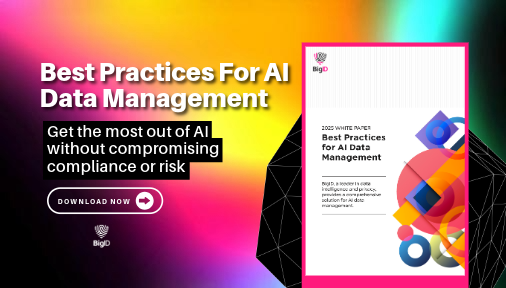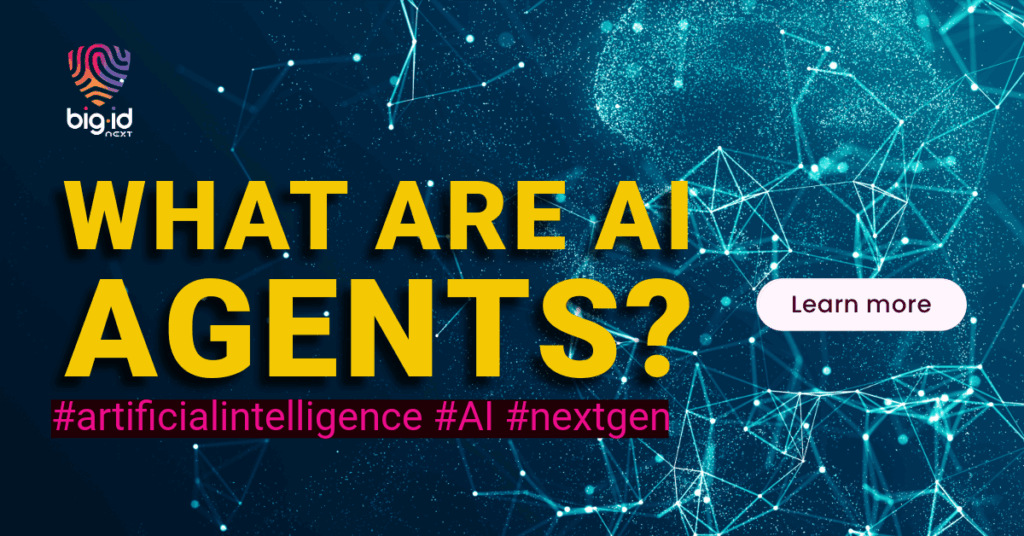KI-Innovationen sind weiterhin beeindruckend, und im Jahr 2025 blicken wir auf das nächste große Ding – AI-AgentenDiese intelligenten Systeme entwickeln sich zur nächsten transformativen Softwareschicht, die Unternehmensabläufe revolutioniert, Mitarbeiter befähigt, Arbeitsabläufe optimiert und die Produktivität auf ein neues Niveau hebt. Doch was genau sind KI-Agenten und wie unterscheiden sie sich von den Generative KI (GenAI) und große Sprachmodelle (LLMs) wir haben gelernt? Und noch wichtiger: Wie können Organisationen sicherstellen, dass die Daten, die diese Agenten darauf vertrauen, dass es sicher, konform und gut verwaltet ist?
Lassen Sie uns eintauchen.
KI-Agenten vs. generative KI und LLMs – Was ist der Unterschied?
Auf den ersten Blick ähneln KI-Agenten möglicherweise generativen KI-Tools wie ChatGPT oder andere LLMs. Es gibt jedoch wichtige Unterschiede:
- Generative KI und LLMs: Diese Tools sind darauf ausgelegt, menschenähnliche Texte, Bilder oder andere Inhalte basierend auf Eingabeaufforderungen zu generieren. Sie eignen sich hervorragend für Aufgaben wie das Verfassen von E-Mails, das Zusammenfassen von Dokumenten oder das Brainstorming von Ideen. Sie sind jedoch reaktiv – sie reagieren auf Benutzereingaben, agieren aber nicht autonom.
- KI-Agenten: KI-Agenten gehen noch einen Schritt weiter. Sie sind proaktive, autonome Systeme, die Aufgaben im Auftrag der Benutzer ausführen können. Stellen Sie sie sich als virtuelle Assistenten vor, die komplexe, mehrstufige Arbeitsabläufe – wie den Abgleich von Jahresabschlüssen, die Verwaltung der Lieferkettenlogistik oder sogar die Generierung von Verkaufskontakten – ohne ständiges menschliches Eingreifen bewältigen können.
Der Hauptunterschied liegt in ihrer Fähigkeit, autonom zu agieren und externe Systeme – wie Datenspeicher – zu nutzen, um ihr Wissen und ihre Fähigkeiten zu erweitern. Lesen Sie mehr über Agentische vs. generative KI
Warum das wichtig ist
Da KI-Agenten zunehmend in Geschäftsprozesse integriert werden, sind sie für die effektive Erfüllung ihrer Aufgaben stark auf externe Datenquellen angewiesen. Dies eröffnet neue Möglichkeiten zur Effizienzsteigerung, birgt aber auch neue Risiken – insbesondere in Bezug auf Datensicherheit, Datenschutz und Compliance.
Funktionsweise von KI-Agenten: Die Rolle von Datenspeichern und Retrieval Augmented Generation (RAG)
Wie alle guten Assistenten sind KI-Agenten stark auf externe Datenquellen angewiesen, um ihre Aufgaben effektiv zu erfüllen. Hier werden Datenspeicher und Retrieval Augmented Generation (RAG) ins Spiel kommen.
- Datenspeicher: Sie bilden das Wissensrückgrat von KI-Agenten. Sie erweitern ihr Wissen durch die Verbindung mit externen Systemen, wie z. B. Datenspeichern. Diese Datenspeicher werden typischerweise implementiert als Vektor-Datenbanken, die es Agenten ermöglichen, auf große Mengen strukturierter und unstrukturierter Daten zuzugreifen und diese zu verarbeiten, darunter:
- Webseiten Inhalt
- Strukturierte Daten (z. B. CSV-Dateien, Tabellenkalkulationen)
- Unstrukturierte Daten (zB PDFs, E-Mails, Textdokumente)
Diese Abhängigkeit von externen Daten birgt jedoch Risiken, insbesondere im Hinblick auf Datenlecks und Sicherheitslücken. Bei unsachgemäßer Verwaltung können vertrauliche Informationen in diesen Datenspeichern offengelegt werden, was zu Compliance-Problemen und Reputationsschäden führen kann.
- Retrieval Augmented Generation (RAG): RAG-Anwendungen ermöglichen es KI-Agenten, über ihre grundlegenden Trainingsdaten hinauszugehen, indem sie relevante Informationen aus externen Quellen in Echtzeit abrufen. Dadurch können Agenten präzisere, kontextbezogene Antworten geben und fundierte Maßnahmen ergreifen.
Beispielsweise kann ein mit dem Kundensupport beauftragter KI-Agent Produktdetails aus der Datenbank eines Unternehmens abrufen, um bestimmte Anfragen zu beantworten, oder ein Finanzagent kann auf Transaktionsaufzeichnungen zugreifen, um Konten abzugleichen.
Herausforderung Datensicherheit bei RAG
RAG erweitert zwar die Fähigkeiten von KI-Agenten, vergrößert aber auch die Angriffsfläche für Datenschutzverletzungen. Unternehmen müssen sicherstellen, dass die abgerufenen Daten sicher, konform und ordnungsgemäß verwaltet sind.

Die Risiken von KI-Agenten: Datenlecks und Sicherheitsbedenken
KI-Agenten bieten zwar enormes Potenzial, bringen aber auch neue Risiken mit sich, insbesondere im Hinblick auf Datensicherheit und Compliance. Zu diesen Risiken gehören unter anderem:
- Zugriff auf sensible Daten: KI-Agenten benötigen für ihre Aufgaben oft Zugriff auf sensible Geschäftsdaten. Sind diese Daten nicht ausreichend gesichert, können sie gefährdet werden. nicht autorisierte Benutzer.
- Schwachstellen in der Vector-Datenbank: Datenspeicher, die häufig als Vektordatenbanken implementiert sind, können zum Ziel von Cyberangriffen werden, wenn sie nicht ausreichend geschützt sind.
- Compliance-Herausforderungen: Organisationen müssen sicherstellen, dass ihre KI-Agenten die Datenschutzbestimmungen einhalten, wie GDPR, CCPA, und andere. Andernfalls kann es zu hohen Geldstrafen und rechtlichen Konsequenzen kommen.
Warum herkömmliche Sicherheitsmaßnahmen nicht ausreichen
Herkömmliche Datensicherheitslösungen sind nicht für die besonderen Herausforderungen von KI-Ökosystemen ausgelegt. Unternehmen benötigen spezielle Tools, um entdecken, klassifizieren, und die Sicherung von KI-bezogenen Datenbeständen, einschließlich Vektordatenbanken und -modellen.
Sichern Sie Ihr KI-Ökosystem mit BigID Next
KI-Agenten verändern die Arbeitsweise. Von der Automatisierung von Routineaufgaben bis hin zur Steuerung komplexer Geschäftsprozesse haben diese intelligenten Systeme das Potenzial, Branchen zu transformieren und neue Produktivitätsniveaus zu erschließen. Mit großer Macht geht jedoch auch große Verantwortung einher. Unternehmen müssen sicherstellen, dass die Daten, die ihre AI Agents ist sicher, konform und gut verwaltet.
BigID Weiter ist die erste modulare Datenplattform, die das gesamte Datenrisiko in Bezug auf Sicherheit, Einhaltung gesetzlicher Vorschriften und KI abdeckt. Sie macht unterschiedliche, isolierte Lösungen überflüssig, indem sie die Funktionen von DSPM, DLP, Datenzugriffsverwaltung, KI-Modellverwaltung, Datenschutz, Datenaufbewahrungund mehr – alles innerhalb einer einzigen, Cloud-nativen Plattform.
So unterstützt BigID Next Unternehmen bei der Transformation von KI-Risiken:
- Vollständige automatische Erkennung von KI-Datenbeständen: Die automatische Erkennung von BigID Next geht über herkömmliches Datenscannen hinaus und erkennt sowohl verwaltete als auch nicht verwaltete KI-Assets in Cloud- und lokalen Umgebungen. BigID Next identifiziert, inventarisiert und ordnet alle KI-bezogenen Datenbestände – einschließlich Modelle, Datensätze und Vektoren – automatisch zu.
- Erster DSPM zum Scannen von KI-Vektordatenbanken: Während des Retrieval-Augmented Generation (RAG)-Prozesses behalten Vektoren Spuren der Originaldaten, auf die sie verweisen, die unbeabsichtigt sensible Informationen enthalten können. BigID Next identifiziert und verringert die Gefährdung von Persönlich identifizierbare Informationen (PII) und andere in Vektoren eingebettete Hochrisikodaten, um sicherzustellen, dass Ihre KI-Pipeline sicher und konform bleibt.
- KI-Assistenten für Sicherheit, Datenschutz und Compliance: BigID Next stellt die ersten agentenbasierten KI-Assistenten ihrer Art vor. Sie unterstützen Unternehmen dabei, Sicherheitsrisiken zu priorisieren, Datenschutzprogramme zu automatisieren und Datenverwalter mit intelligenten Empfehlungen zu unterstützen. Diese KI-gesteuerten Copiloten sorgen dafür, dass Compliance proaktiv und nicht reaktiv bleibt.
- Risikowarnung und -management: KI-Systeme bergen Datenrisiken, die über die Daten selbst hinausgehen und sich auch auf diejenigen erstrecken, die Zugriff auf sensible Daten und Modelle haben. Die verbesserte Risikowarnung von BigID Next verfolgt und verwaltet Zugriffsrisiken kontinuierlich und bietet Transparenz darüber, wer auf welche Daten zugreifen kann. Dies ist besonders wichtig in KI-Umgebungen, in denen große Benutzergruppen häufig mit sensiblen Modellen und Datensätzen interagieren. Mit BigID Next können Sie die Datengefährdung proaktiv bewerten, Zugriffskontrollen durchsetzen und die Sicherheit zum Schutz Ihrer KI-Daten erhöhen.
Um zu sehen, wie BigID Weiter kann Ihnen helfen, die Leistungsfähigkeit von KI-Agenten selbstbewusst zu nutzen – Holen Sie sich noch heute eine 1:1-Demo mit unseren Experten.


